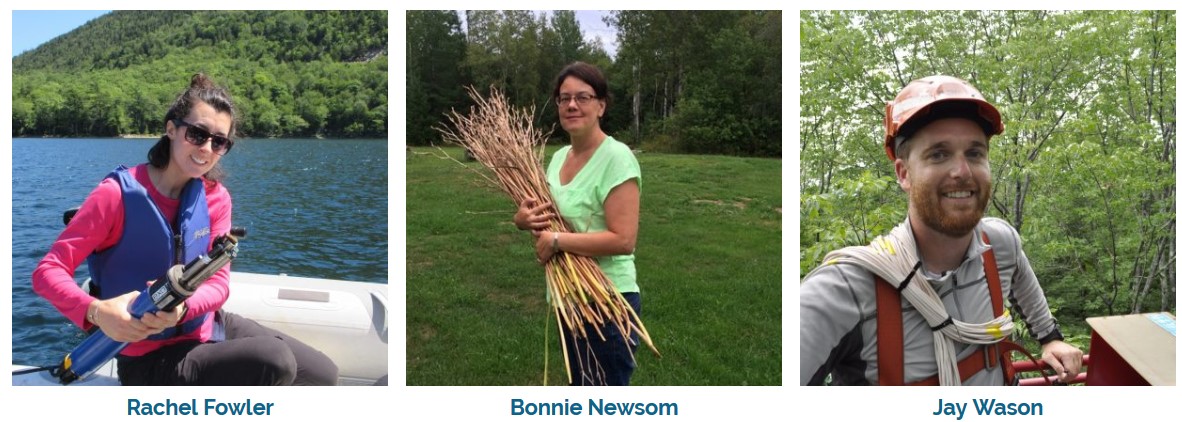Three scientists have been awarded fellowships to conduct research in Acadia National Park as part of Second Century Stewardship, an initiative of the National Park Service, Schoodic Institute at Acadia National Park, and the National Park Foundation.
Second Century Stewardship was launched in 2016 upon the centennial of the National Park Service to provide relevant scientific research for park stewardship, build public engagement with science, and pursue solutions to critical issues for parks and society.
After reviewing dozens of applications from nine states, three research fellows were selected:
- Rachel Fowler, Laboratory Coordinator with UMaine School of Biology and Ecology
- Bonnie Newsom, Assistant Professor of Anthropology at the University of Maine
- Jay Wason, Assistant Professor of Forest Ecosystem Physiology at the University of Maine
“These research fellowships apply the power of modern science to explore issues of great importance. Congratulations to the fellows, and to Schoodic Institute and Acadia National Park for their leadership in a program with such compelling and far reaching implications for smart, science-based stewardship of our natural world,” said David Shaw, founder of Second Century Stewardship.
“Thanks to David Shaw’s leadership and financial support, we are building the next generation of science education leaders who will ensure our national parks are prepared for the challenges ahead,” said National Park Foundation President and CEO Will Shafroth. “These fellowships focus science and innovation where they’re needed most, helping to ensure our national parks are healthy and resilient now and in the future.”
The Second Century Stewardship approach to research, science communication, and citizen science has been integrated with the efforts of more than 60 parks and partners across the National Park System.
More about the fellows and their research:
Fowler has been monitoring water quality in Jordan Pond as an aquatic scientist with Friends of Acadia since 2016. She aims to develop an early warning system for detecting blooms of cyanobacteria, a kind of algae that thrive in warm, nutrient-rich waters and can be toxic to people and animals. According to Acadia National Park biologist Bill Gawley, this information can help park staff anticipate water quality problems, communicate potential risk in a timely manner, and protect visitor safety and ecological integrity of Acadia’s lakes.
Newsom will analyze existing archaeological collections from shell midden sites in Acadia National Park to chronicle past occupation and use, and generate a baseline data set for future studies of Indigenous peoples and their connections to the region. “Dr. Newsom’s approach to integrate archeological data with Indigenous perspectives to interpret the past is ground-breaking research,” said Rebecca Cole-Will, Chief of Resource Management at Acadia National Park. “As park service managers, we are responsible for preserving and protecting significant cultural resources. The results of this novel approach to consultation and research will fully integrate Wabanaki perspective and inform stewardship.”
Wason will study coastal spruce-fir forests in Acadia. Scientists and park managers know very little how these forests change as they age, or how sensitive they are to climate shifts. Wason plans to replicate historical surveys of Acadia forests to see how they, and the climate, have changed over the past sixty years, with the goal of informing projections of how they might change in the next sixty years. “Acadia’s forest communities may change significantly. We need to know if coastal spruce and fir have a future here, and what that future looks like,” said Jesse Wheeler, vegetation biologist with Acadia National Park.
“We appreciate the partnership of Schoodic Institute in the Second Century Stewardship initiative,” said Acadia National Park Superintendent Kevin Schneider. “Their goal of advancing science and science communication plays a very important role in preserving Acadia’s natural and cultural resources.”
“We know environmental conditions are changing rapidly in Acadia. The Second Century Stewardship approach is providing the research, communication and engagement needed to apply science to these critical challenges,” said Nick Fisichelli, Schoodic Institute President and CEO.
About the Second Century Stewardship partner organizations:
Schoodic Institute at Acadia National Park is a nonprofit partner to the National Park Service, helping achieve the original vision for Acadia as a destination for science and inspiration, and a national leader for research that fosters environmental stewardship.
More than 20,000 National Park Service employees care for America’s 417 national parks and work with communities across the nation to help preserve local history and create close-to-home recreational opportunities.
The National Park Foundation is the national charitable nonprofit generating private support and building strategic partnerships to protect and enhance America’s national parks for present and future generations.
This project is made possible in part by a grant from the National Park Foundation through a generous donation from the David Evans Shaw Family Foundation.
